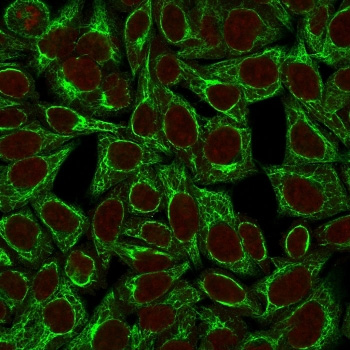- Tel: 858.663.9055
 Email: info@nsjbio.com
Email: info@nsjbio.com
- Tel: 858.663.9055
- Email: info@nsjbio.com
KRT8 Antibody detects keratin 8, a type II intermediate filament protein widely expressed in simple epithelia. Together with keratin 18, KRT8 forms heterodimers that provide mechanical stability and regulate signaling in epithelial cells. Keratin 8 is expressed in liver, pancreas, intestine, and other glandular tissues, making it a key epithelial marker.
Mutations or altered expression of KRT8 are linked to liver disease, inflammatory disorders, and epithelial cancers. For example, KRT8 variants predispose individuals to liver fibrosis and cirrhosis, while aberrant expression is observed in colorectal, breast, and pancreatic cancers. The KRT8 Antibody provides researchers with a highly specific tool to detect keratin 8 in tissues, lysates, and cell models, supporting studies in development, pathology, and translational medicine.
Because of its broad expression and disease relevance, Keratin 8 Antibody reagents are indispensable in cell biology, pathology, oncology, and regenerative research.
NSJ Bioreagents supplies KRT8 Antibodies validated for immunohistochemistry, immunofluorescence, western blotting, ELISA, and flow cytometry. Each KRT8 Antibody is rigorously tested for specificity against keratin 8 and minimal cross-reactivity with related keratins such as KRT18 and KRT19.
By choosing a KRT8 Antibody from NSJ Bioreagents, scientists gain reagents optimized for reproducibility. Our antibodies deliver crisp staining in epithelial tissues, reliable protein detection in western blotting, and consistent results across platforms. Detailed datasheets, positive control suggestions, and application protocols ensure that Keratin 8 Antibody products meet the needs of both discovery science and translational studies.
The KRT8 Antibody is used across a broad range of fields, reflecting keratin 8’s central role in epithelial biology.
KRT8 Antibodies identify simple epithelia in developing tissues.
The KRT8 Antibody is applied in embryology to track epithelial differentiation.
Keratin 8 Antibody reagents support studies of epithelial organization and polarity.
KRT8 Antibodies detect altered expression in liver fibrosis, hepatitis, and cirrhosis.
The KRT8 Antibody helps clarify keratin mutations associated with liver disease susceptibility.
Researchers use Keratin 8 Antibody tools to investigate pancreatic inflammation and pathology.
KRT8 Antibodies identify epithelial tumors in colorectal, breast, and pancreatic cancers.
The KRT8 Antibody supports studies of epithelial-to-mesenchymal transition (EMT) in metastasis.
Keratin 8 Antibody reagents are applied to biomarker discovery and prognosis evaluation.
KRT8 Antibodies detect epithelial responses to inflammation in Crohn’s disease and ulcerative colitis.
The KRT8 Antibody is applied to clarify epithelial contributions to immune defense.
KRT8 Antibodies validate epithelial differentiation from stem cells.
The KRT8 Antibody is applied to tissue engineering to confirm correct epithelial marker expression.
KRT8 Antibodies support biomarker validation in clinical trials.
The KRT8 Antibody is used in drug development to monitor epithelial toxicity or therapeutic efficacy.
Keratin 8 Antibody reagents contribute to personalized medicine by linking keratin expression to disease outcomes.
Keratin 8 is a structural and functional protein central to epithelial stability and disease. The KRT8 Antibody provides precise detection of this protein, while Keratin 8 Antibody reagents more broadly support discoveries in oncology, hepatology, gastroenterology, and regenerative research.
In basic biology, KRT8 Antibodies clarify epithelial differentiation and organization. In pathology, the KRT8 Antibody highlights keratin changes in liver disease, pancreatic pathology, and inflammatory disorders. In oncology, Keratin 8 Antibody tools serve as biomarkers for diagnosis, prognosis, and therapy development.
Clinically, keratin 8 mutations and altered expression are being recognized as risk factors and diagnostic indicators. By providing accurate detection, the KRT8 Antibody links molecular biology with patient care, supporting progress in precision medicine.
Keratin 8 is a major epithelial protein with roles in tissue stability, signaling, and disease. The KRT8 Antibody equips researchers and clinicians with a dependable tool for detecting and analyzing keratin 8, while Keratin 8 Antibody reagents more broadly support discoveries in epithelial biology, oncology, liver disease, and regenerative medicine. By bridging basic science with translational medicine, these antibodies remain vital for advancing research and improving human health.

Immunofluorescent staining of permeabilized human HeLa cells with KRT8 antibody (TS1, green) and Reddot nuclear stain (red).